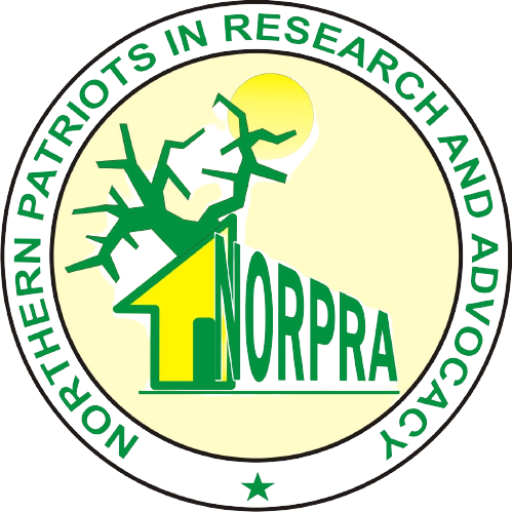- 0382097030/0209313630/0246067564
- info@norpra.org / northernpatriots2007@gmail.com
- BUKERE, BOLGATANTA-GHANA
THE ORGANIZATION
Northern Patriots in Research and Advocacy (NORPRA) was incorporated on the 6th of February, 2007 by the Registrar-General Department with registration No. CG169202015. It is also licensed by the Non-Profit Organizations Secretariat of the Republic of Ghana with license no. DSW/6367.
NORPRA, with a mission to research, advocate and empower youth, women and persons with disability in underserved communities for poverty eradication and sustainable equitable development, envisions a society without poverty, inequalities, injustice and insecurity.
NORPRA’s main goal is to improve livelihoods of women, youth and persons with disability through empowerment for improved food security, employment and incomes, influencing increased public and private investment in underserved communities for equitable development, promotion of peace and security in communities affected by violent conflicts and threats of violent extremism, improving participation in decision-making at all levels and promotion of health and rights protection.
The organization is governed by a Governing Board chaired by Prof. David Millar with Prof. Isaac Agyemang as co-chair. Its Management Team is also drawn from various fields of expertise.
With core values of Integrity, Accountability, Partnership, Inclusiveness, Professionalism and Non-partisan, NORPRA uses Research, Mobilization, Sensitization, Training, Monitoring, Tracking, Policy briefs and Engagement to deliver its programmes and projects.
NORPRA has over the years partnered and worked with many local and international organizations that share in its vision and mission. These organizations include British Council, IBIS West Africa, SEND-Ghana, UN-Habitat, USAID/Chemonics, Care International, St Francis Xavier University in Canada, USAID/NGGA/AGREE, Water Aid Ghana, Extractive Industries Transparency Initiative (EITI), GIZ, Africa Centre for Energy Policy (ACEP), USAID GTI and WASCAL.
A Society without
1. Poverty
2. Inequalities
3. Injustice and
4. Insecurity.
NORPRA exists to research, advocate and empower youth, women and persons with disability in underserved communities for poverty eradication and sustainable equitable development
Integrity: We are committed to building stakeholders’ confidence and trust in our activities to consolidate our credibility in research and policy advocacy gained over the years
Inclusiveness: We are committed to including the excluded in the spirit of leaving no one behind in our equitable and sustainable development drive
Partnership. We value working in collaboration with others as individual organizations, networks and coalitions for shared knowledge and resources for realization of our vision
Accountability: We demand openness and responsiveness of duty bearers in our activities and demonstrate same to our beneficiaries
Professionalism: We strongly value high level of ethical standards, scientific approach, competence, expertise, systems and procedures in the discharge of our core mandate with high sense of objectivity.
Non-partisan: We are committed to being an apolitical organization without loyalty, fear or favour to any political party in government in delivering our core mandate
We work to improve sustainable livelihoods of youth, women and persons with disability in mining communities by influencing increased participation of communities in decision-making, equitable sharing of mineral wealth and promoting transparency and accountability in mineral resource extraction and management
As part of efforts towards promoting transparency and accountability in natural resource governance, we engage in data collection and analysis of beneficial ownership and integrity screening of companies in the extractive sector.
We also advocate for respect and protection of the rights of mining communities guaranteed by the minerals and mining policies and legal frameworks.
1. Past: British Council, IBIS West Africa, UN-Habitat, USAID/Chemonics, St Francis Xavier University of Canada, Care International & SEND Ghana.
2. Current: ACEP, USAID GTI, Water Aid Ghana, GiZ and EITI
We promote agricultural-led transformation of farming communities for food security, employment and poverty reduction through influencing agricultural policy for increased public investment in the sector.
We engage in data collection and policy analysis, policy monitoring, community sensitization and training, use of procurement monitoring, community score cards, social audit and public expenditure tracking on agricultural projects and stakeholders’ engagement on transparency and accountability in agricultural resource governance and management.
We support sustainable livelihoods of communities by promoting agribusiness for improved productivity and incomes
